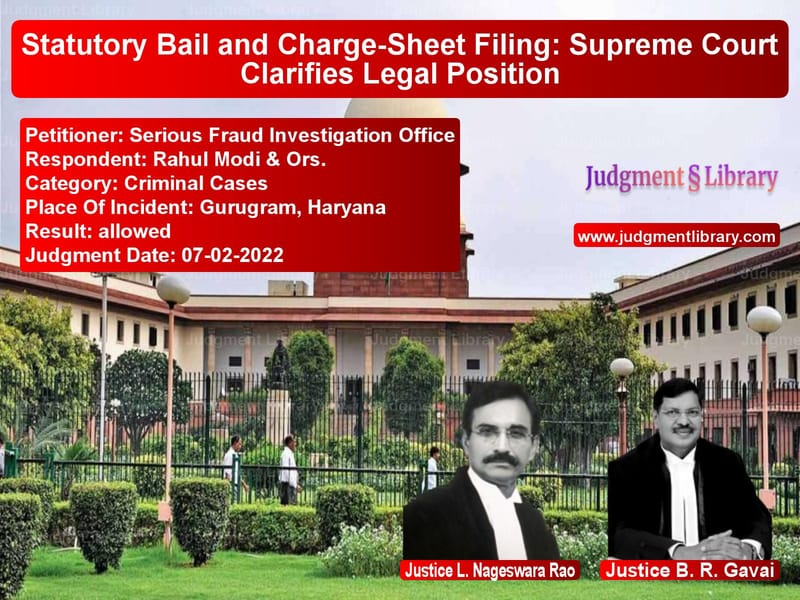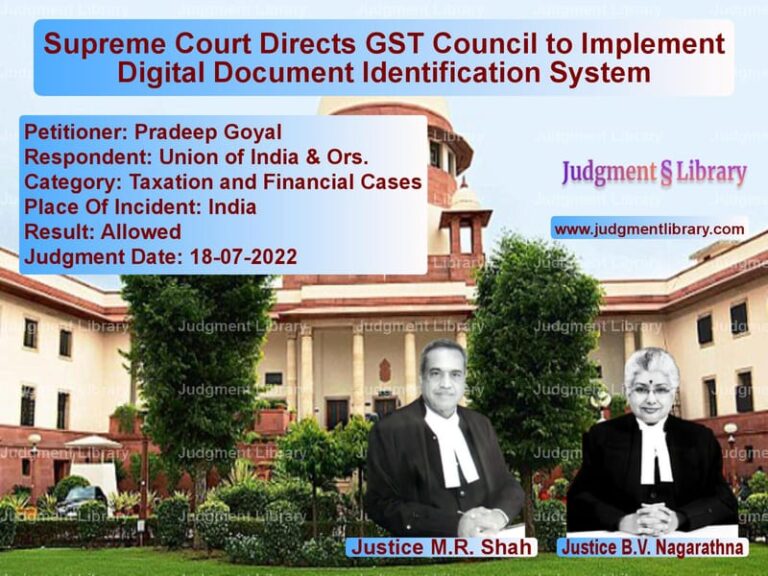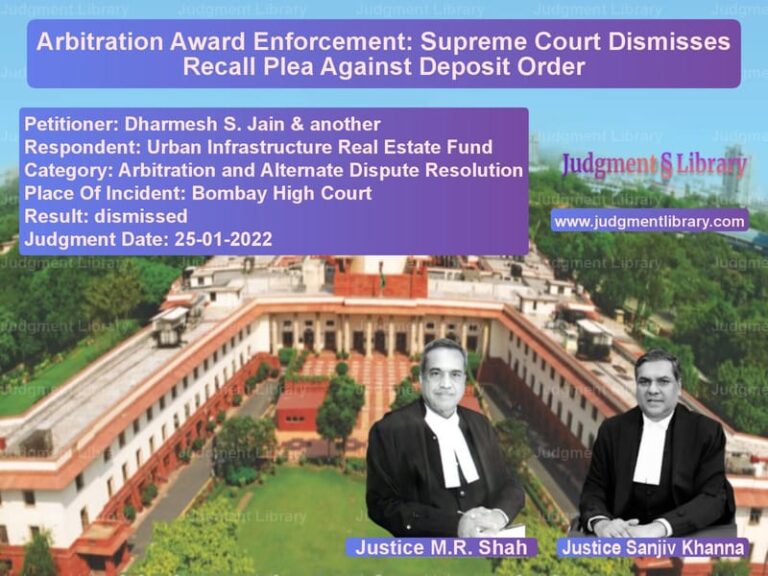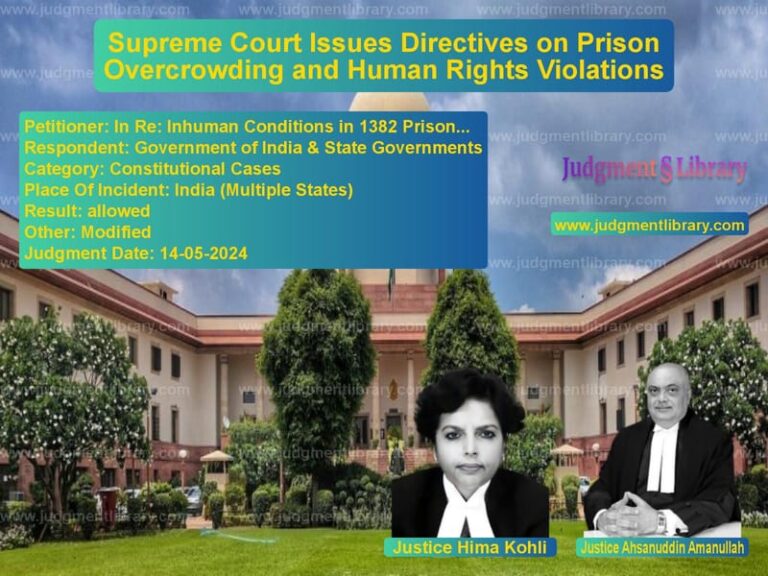Statutory Bail and Charge-Sheet Filing: Supreme Court Clarifies Legal Position
The Supreme Court of India recently delivered a crucial judgment in the case of Serious Fraud Investigation Office (SFIO) vs. Rahul Modi & Ors., clarifying the legal position regarding statutory bail under Section 167(2) of the Criminal Procedure Code (CrPC). The judgment addresses whether an accused is entitled to statutory bail if the charge-sheet is filed within the statutory period but cognizance is taken after the expiry of that period.
Background of the Case
The case arose from an investigation into the financial irregularities of Adarsh Group of Companies and LLPs, conducted by the Serious Fraud Investigation Office (SFIO) under the Companies Act, 2013. The Central Government ordered an inquiry under Section 212(1)(c) of the Companies Act and the Limited Liability Partnership Act, 2008.
Key developments:
- Rahul Modi and another accused were arrested on 10.12.2018 with the approval of the SFIO Director.
- They were initially granted interim release by the Delhi High Court, but this order was set aside by the Supreme Court on 27.03.2019, requiring them to surrender.
- They surrendered on 01.04.2019 and were remanded to judicial custody on 05.04.2019.
- The Special Court extended their judicial custody multiple times.
- The SFIO filed a complaint (equivalent to a charge-sheet) on 18.05.2019, before the expiry of the statutory period of 60 days.
- The accused filed for statutory bail on 20.05.2019, arguing that cognizance had not been taken before the expiry of 60 days.
- The Special Court rejected their bail plea on 22.05.2019, holding that the complaint was filed within time.
- The Punjab and Haryana High Court, however, granted statutory bail on 31.05.2019, reasoning that since cognizance was not taken before 60 days, the accused were entitled to bail.
- The SFIO challenged this order before the Supreme Court.
Petitioner’s Arguments (SFIO)
- The SFIO contended that the High Court erred in granting statutory bail despite the fact that the charge-sheet was filed before the 60-day period expired.
- They argued that under Section 167(2), CrPC, an accused can only claim statutory bail if the charge-sheet is not filed within the statutory period.
- It was contended that the CrPC does not require cognizance to be taken within the 60-day period; only the filing of the charge-sheet is necessary to defeat the claim of statutory bail.
- The prosecution relied on the Supreme Court’s ruling in Suresh Kumar Bhikamchand Jain vs. State of Maharashtra (2013), which held that statutory bail cannot be granted once a charge-sheet is filed within the prescribed period.
Respondents’ Arguments (Rahul Modi & Ors.)
- The accused argued that their right to statutory bail under Section 167(2) CrPC became indefeasible because cognizance was not taken before the expiry of 60 days.
- They relied on the Supreme Court’s judgment in Sanjay Dutt vs. State (1994) and Madar Sheikh vs. State of Maharashtra (1996), which they claimed established that statutory bail remains available if cognizance is not taken before the expiration of the statutory period.
- The accused contended that the intent of Section 167(2) CrPC was to prevent prolonged detention without judicial scrutiny.
- They also relied on the case of M. Ravindran vs. Intelligence Officer (2021), which reinforced the importance of cognizance in bail considerations.
Supreme Court’s Judgment
The Supreme Court set aside the High Court’s order, ruling in favor of the SFIO and holding that the filing of the charge-sheet within the statutory period is sufficient to deny statutory bail, regardless of when cognizance is taken.
Key Observations of the Supreme Court:
- The Court reaffirmed the precedent set in Bhikamchand Jain, stating that the filing of the charge-sheet within the statutory period satisfies the requirement of Section 167(2) CrPC.
- It clarified that taking cognizance is a judicial function, whereas filing a charge-sheet is an investigative function. The statutory period under Section 167(2) applies only to the investigation stage.
- The Court distinguished the earlier cases cited by the accused, stating that in Madar Sheikh, the reference to cognizance was based on the specific facts of that case and should not be generalized.
- It held that the High Court erred in interpreting Section 167(2) to require cognizance within 60 days, as this would introduce an additional requirement not envisaged by the statute.
Key Excerpts from the Supreme Court Judgment
On the role of cognizance, the Court stated:
“The scheme of the CrPC is such that once the investigation stage is completed, the court proceeds to the next stage, which is the taking of cognizance and trial. The two stages are distinct, and the transition from one to the other does not affect the detention of the accused.”
Regarding statutory bail, the Court held:
“The High Court’s interpretation of Section 167(2) introduces an artificial distinction between the filing of a charge-sheet and the taking of cognizance, which is not supported by the statutory framework.”
On the binding nature of precedents, the Court ruled:
“The judgment in Bhikamchand Jain (2013) is binding and squarely covers the present case. The High Court’s reliance on Madar Sheikh (1996) was misplaced.”
Final Verdict
The Supreme Court allowed the SFIO’s appeal and issued the following directions:
- The High Court’s order granting bail to Rahul Modi and others was set aside.
- The accused were ordered to surrender immediately to judicial custody.
- The Trial Court was directed to proceed with the case expeditiously.
- Future bail applications must be decided based on the merits of the case, not under Section 167(2).
Conclusion: Implications of the Judgment
This judgment clarifies a crucial aspect of criminal procedure and statutory bail:
- It confirms that filing a charge-sheet within the statutory period prevents an accused from claiming default bail.
- The ruling prevents misuse of procedural loopholes to obtain bail where investigations have been completed within time.
- It ensures that detention beyond 60 or 90 days remains legally valid as long as the charge-sheet is filed.
- The decision reinforces judicial efficiency by preventing unnecessary delays caused by misconstrued interpretations of Section 167(2) CrPC.
By settling the debate on statutory bail and charge-sheet filing, this ruling establishes a clear precedent for future cases and strengthens the prosecution’s ability to prevent unwarranted bail applications.
Petitioner Name: Serious Fraud Investigation Office.Respondent Name: Rahul Modi & Ors..Judgment By: Justice L. Nageswara Rao, Justice B. R. Gavai.Place Of Incident: Gurugram, Haryana.Judgment Date: 07-02-2022.
Don’t miss out on the full details! Download the complete judgment in PDF format below and gain valuable insights instantly!
Download Judgment: serious-fraud-invest-vs-rahul-modi-&-ors.-supreme-court-of-india-judgment-dated-07-02-2022.pdf
Directly Download Judgment: Directly download this Judgment
See all petitions in Fraud and Forgery
See all petitions in Money Laundering Cases
See all petitions in Bail and Anticipatory Bail
See all petitions in Extortion and Blackmail
See all petitions in Theft and Robbery Cases
See all petitions in Judgment by L. Nageswara Rao
See all petitions in Judgment by B R Gavai
See all petitions in allowed
See all petitions in supreme court of India judgments February 2022
See all petitions in 2022 judgments
See all posts in Criminal Cases Category
See all allowed petitions in Criminal Cases Category
See all Dismissed petitions in Criminal Cases Category
See all partially allowed petitions in Criminal Cases Category







